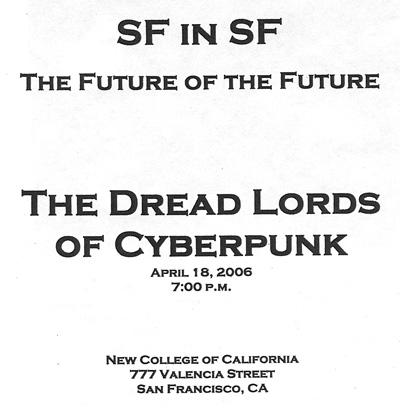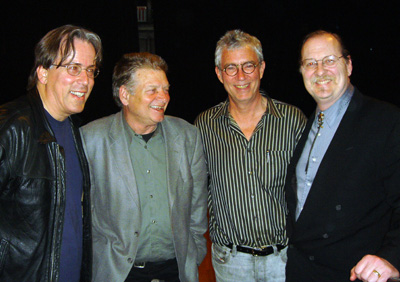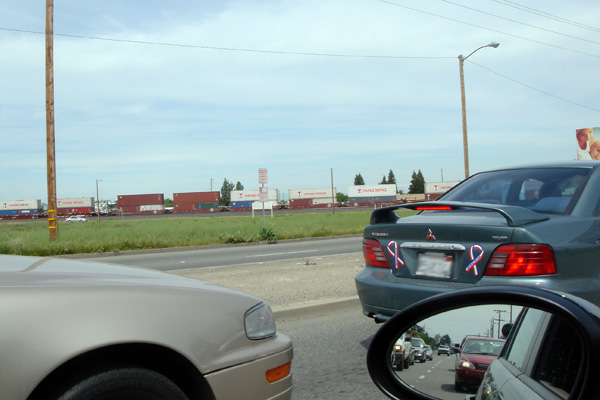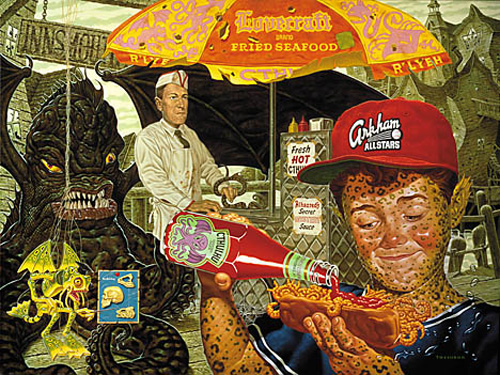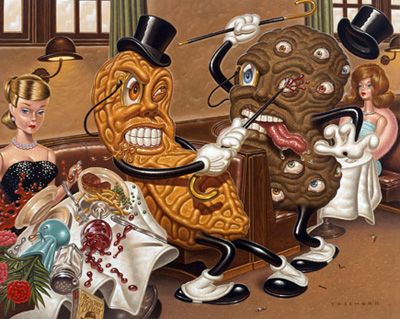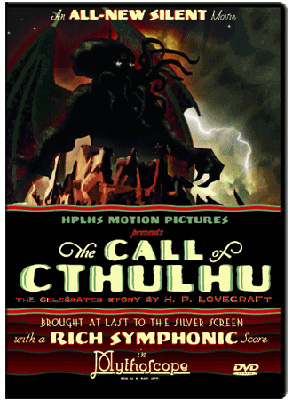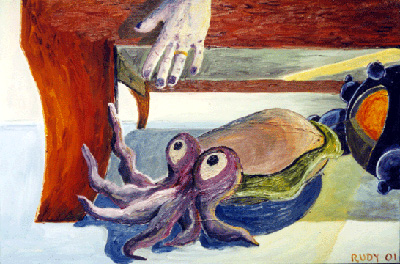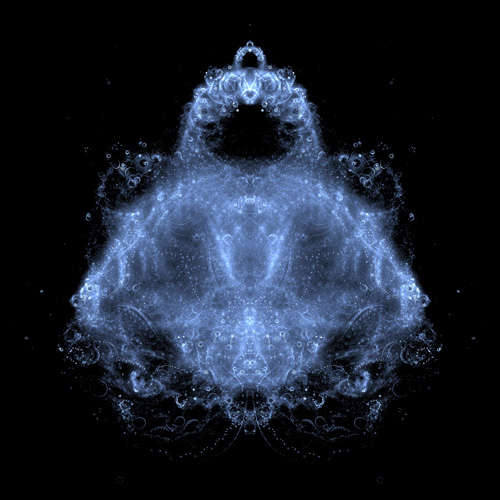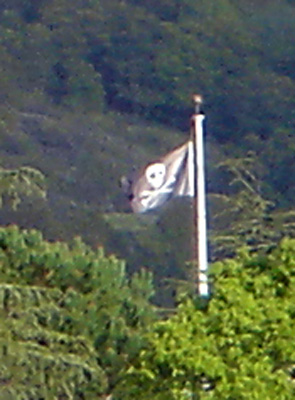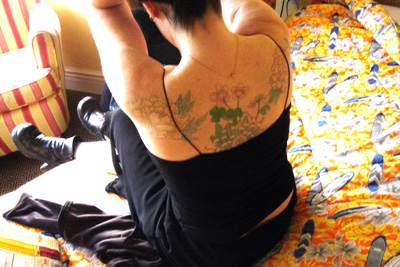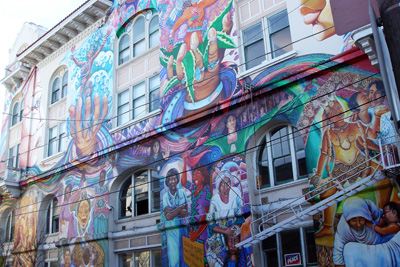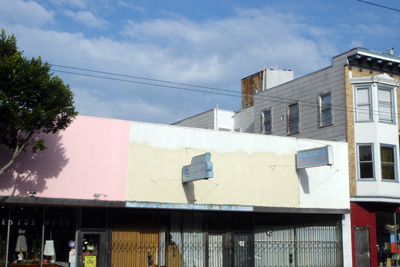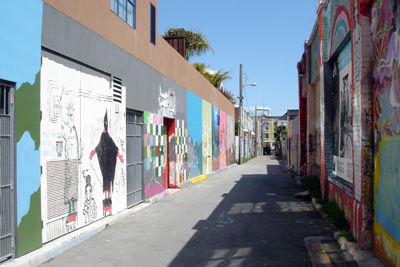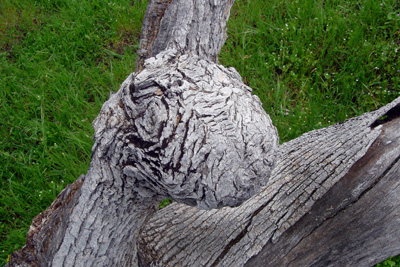
I gave a talk on “Gnarly Computation” to the math department at Fresno State University this week. That’s an actual tree gnarl in the picture above, that is, the original meaning of a “gnarl” is a lump like that. I saw the tree in the Sierra foothills the day after the talk. You can get a podcast of the talk at the button below.
You can click the following link to view the Powerpoint slides of my talk.

I soared into Fresno State about ten years ago to speak on, I imagine, cellular automata. Nobody here remembered my visit, nor the person who’d invited me then. But I recognized the buildings.
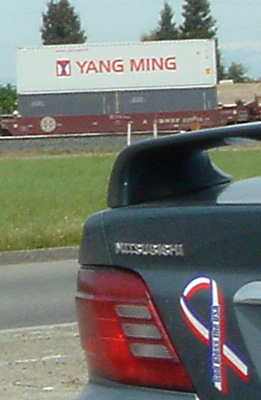
Fresno feels like Middle America, although more ethnic. I felt remote there. Like a robotically operated Martian lander. This picture shows a train of Chinese goods moving in containers, with a car wearing “God Bless the USA” ribbons. The same administration that's destroying our economy with tax cuts for the rich and paying the bills with loans from China wants us to be patriotic. Don't get me started. Thinking about poltics these days is so alienating. I comfort myself by remembering that even if we have a perhaps illegitimate (due to election irregularities) leader, it really isn't Nazi Germany here, and the Smirking Chimp really isn't a dictator. And, you know, we survived Nixon — although getting out and demonstrating against him did make a difference. It's curious how acquiescent the public has become.

The next few pictures are from a drive I took Route 180 east from Fresno towards the Sierras. I stopped near some orange groves and then I wandered around some cow-pasture foothills covered with big chunks of granite. I saw ground sqirrels, turke vultures, cows, Monarch butterflies, quail and really big black shiny lizards.

My hosts were the age of my children, mid-thirties. They were cute and smart and quirky, as math profs are. I love mathematicians. Some of them asked me a few questions from the audience, and I couldn’t tell if they were teachers or grad students. I’m getting so old. Not that I feel old, it’s more like I’m living in a different world from the young people starting their careers. Really, my math prof stint was two careers ago.

The talk went fine, but the whole exercise felt a little pointless. I no longer have any career interest in promoting myself to math departments; I’m never gonna be looking for an academic job again. And at this point, I’ve somewhat lost interest in promulgating the Wolframite belief that reality is made of gnarly computations. I still think it’s true, but I’m tired of pointing it out.

I drove down to Fresno in my new racing-green BMW 325i, which handles really nicely. I’m still beating down concerns that I might have selected the wrong brand, model, options or color — second-guessing my decisions is a neurosis of mine. But I am growing fond of what I ended up with. Of course on a big highway it doesn’t make all much difference what kind of car you’re in. It’s just driving. The handling excitement only kicks in when you’re on a two-lane twisty road. I stopped at the San Luis reservoir, which was full for once.
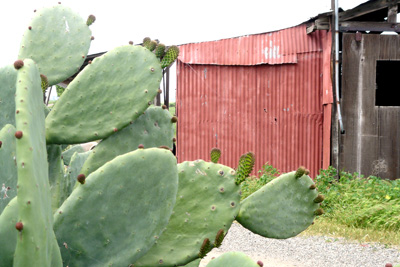
On the longer and more heavily trafficked than expected drive, I listened to iPod shuffle of the eight hundred or so songs from old CDs of mine that I’ve ripped. Sometimes a song takes me away; sometimes using the iPod is almost like being high, particularly when I bike or walk around with the earbuds in — high in that sense of not thinking about useful things, of idly spinning your mind. A downside of iPod is that it can feel like constant consuming, and my thoughts are to some extent shackled or slaved to the digital input instead of free to roam. This can be an upside, in that often my thoughts roam into lacertating or fruitless loops.
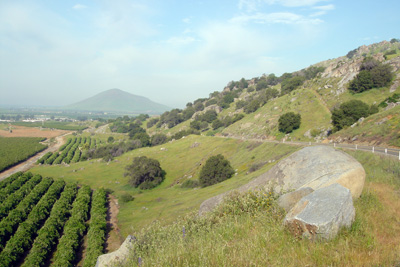
I filmed a nice moment hearing a song from the O Brother Where Art Thou soundtrack, my car parked under a tree by the King River. Click here to view movie (43 Meg). Nature rolls on.










